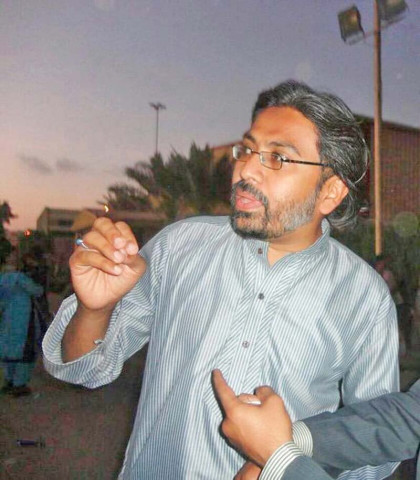Silencing the intelligentsia: An ode to Prof Waheedur Rehman
Colleagues and students remember him for struggle, revolutionary teaching methods

Prof Dr Waheedur Rehman. PHOTO: FILE
Prof Dr Waheedur Rehman, more popularly known by his pen name, Yasir Rizvi, was assassinated on April 28 by unknown motorcyclists as he was heading towards the University of Karachi, where he served as an assistant professor in the Mass Communications Department.
"Rehman's mother passed away weeks after he was conferred a doctorate degree by the University of Karachi in 2008," recalled a colleague of the slain academic. "At least his mother was spared the horror of seeing her 'doctor of wisdom' assassinated on the streets of the city whose children he was teaching," he added.
To honour his memory, senior journalists are organising a memorial event at Karachi Press Club today at 4pm.
The University of Karachi has lost two of its best teachers in these acts of violence within six months of each other. Last September, the dean of the varsity's Islamic Studies Department, Prof Dr Muhammad Shakil Auj, was killed hours after attending a reception in his honour, organised by the Iranian Cultural Centre in Karachi.
Making of the academic
Friends and colleagues have described the assassination of scholars as severe blows to the academic struggle for a better society. Forty-two-year-old Rehman's is a sad example.
During interviews, colleagues and personal acquaintances recalled the years he spent in the struggle to realise his mother's dream. "His father passed away at an early age. His modest earnings as a journalist always made it difficult for the family to live a luxurious life," an old friend of Rehman told The Express Tribune.

The neighbours recalled the same. "Rehman lived all his life in flats like these," a resident murmured, attempting to explain the difficult life a middle-class citizen spends in small apartments. "We are all witness to his struggle. The time to enjoy life had just begun," he lamented, going on to reveal how the recent confirmation of his job as an assistant professor at the KU had strengthened him economically.
Unwished birthday
But the joy was short-lived. Days before his children and students would have made his day by wishing him on his 43rd birthday, the assailants gave all a reason to mourn.
Around six bullets were pumped into the restless body of the man who always found a reason to smile. From the pin-drop silence of Abbasi Shaheed Hospital's mortuary, rose the cries of Rehman's mentors, colleagues, friends and students. One question surrounded everyone's minds: Who was the biggest loser in the ordeal?
"Professor Waheedur Rehman revolutionised the old teaching methods. He made the lessons more practical and interactive. The varsity appointed some senor journalists as visiting faculty while renowned reporters would be invited to share their personal experiences," recalled a student, Ammar.
The journalists benefitted almost as much as the students. "Rehman's efforts had resulted in around 15 to 20 media professionals getting enrolled for the PhD programme. He wanted the media professionals to enhance their skills through teaching," a visiting lecturer told The Express Tribune.
The academia sees the killings of teachers and scholars as a huge loss for an already ailing society. "The voices of reason are being silenced, one by one," said Prof Dr Jamil Hassan Kazmi, president of the KU teachers' society. "We have been forced to brave the loss of another colleague, whose only weapon was his pen and knowledge."
The civil society shares the same concerns. "It certainly is a great loss. We are very concerned," remarked chairperson of the Human Rights Commission of Pakistan, Zohra Yusuf. The commission has documented an upsurge in the killings of the intelligentsia, including civil society activists, scholars, lawyers and other professionals.
Yusuf regretted that Karachi — a city once home to the most accomplished professionals — has of late been very unkind to its university professors and social activists such as Parween Rehman and Sabeen Mehmood.
At a condolence reference for the slain professor, his colleagues debated "who is next."
From the audience, a young man whispered. "I may be next. But I hope my mother passes away before that so she doesn't have to grieve over me."
Published in The Express Tribune, May 21st, 2015.



















COMMENTS
Comments are moderated and generally will be posted if they are on-topic and not abusive.
For more information, please see our Comments FAQ